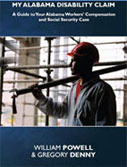ABCs of Social Security Disability
Social Security Disability has a unique set of laws, with different rules and procedures from general tort law. As such, Social Security Disability law has developed its own linguistics and phraseology that can be confusing to lawyers who do not emphasize Social Security Disability claims in their practice-more so for disabled workers. In this last blog on the terminology used in Social Security law, we will define some last general terms you will come across.
————————————————————————————————————
SSDI
SSDI stands for Social Security Disability Insurance. To qualify for SSDI benefits, you must show that (i) you meet the legal definition of being disabled and (ii) that you are insured for disability purposes. You become insured for disability purposes by paying your social security taxes while being able to work. There are four quarters in each financial year, and you can “earn” up to 4 credits per year. To be fully insured for disability benefits, you must have 20 out of 40 credits, which breaks down to having worked 5 of the last 10 years. So, if you have a good work history and last worked in 2009, you should be insured through 2014 (5 years out).
How much asset you have is immaterial. If you have earned enough credits and meet the legal definition of being disabled, you are entitled to Social Security Disability Insurance benefits-even if you are worth over a million dollars. You may also be legally disabled, but unable to draw SSDI benefits due to a lack of credits-although you may still be entitled to SSI benefits.
————————————————————————————————————
SSI
SSI stands for Supplemental Security Income. Like SSDI benefits, there are two hurdles you must clear to be eligible for benefits. First, you must first show that you meet the legal definition of being disabled. Secondly, you must not have more than $2,000.00 ($3,000.00 for a married couple) in assets.
The reason for the asset limitation is because Supplemental Security Insurance benefits is a “needs based” program. It is a social safety net for persons incapable of substantial gainful employment who do not qualify for SSDI benefits. You may be found to be disabled, but still unable to draw SSI benefits if you have too much in assets.
Resource limit exclusions include the home that an individual or couple live in and the land it is on, and one vehicle (generally the highest valued vehicle). Any other resource that can be converted to cash counts against the resource limit. Resources could be extra vehicles, land, cash, jewelry, stocks, bonds, 401 K plans, trust funds, bank checking or savings accounts, etc.
————————————————————————————————————
Alleged Onset Date
Your Alleged Onset Date (AOD) is the date when your medical condition first prevented you from being able to hold a job. Many people who apply for Social Security Disability or SSI benefits believe this is the date when they were first diagnosed with their medical problem-but this is incorrect
————————————————————————————————————
Date Last Insured
Your Date Last Insured (DLI) is the latest date someone filing for Social Security Disability benefits is eligible for SSDI benefits; they must be able to prove that their disability began prior to this date. If you Date Last Insured was December 31, 2014, then in order to obtain Social Security Disability benefits, you have to be able to prove that you became disabled prior to December 31, 2014; if your disability began on January 1, 2015, then you would not be able to obtain SSDI benefits.
Your Date Last Insured is based on you working and paying your Social Security taxes for 20 out of the last 40 quarters (5 out of your last 10 years working). SSDI stands for Social Security Disability Insurance, and paying your Social Security taxes is in effect paying your premium for coverage. For instance, if you have worked your adult life and last worked 5 years ago, then you would still be insured and therefore eligible for SSDI benefits; if you last worked 2 years ago you would be insured for SSDI benefits for the next 3 years.
If you DLI has expired prior to your becoming disabled, then you are not entitled to SSDI benefits, but you may still be eligible for SSI benefits as SSI is not based on the number of quarters you have paid into the system, but instead is based on your being disabled and having very little in assets and income.
If you believe that you are entitled to Social Security Disability or SSI benefits and you have questions about your rights, don’t hesitate to contact and speak with one of the experienced Alabama Disability Attorneys at Powell and Denny for a free consultation; and remember, virtual appointments are available through Zoom from wherever you live.
Powell and Denny: We Work When You Can’t
Offices in Birmingham, Alabama and Huntsville, Alabama
Powell and Denny: We Work When You Can’t
Offices in Birmingham, AL and Huntsville, AL
Alabama Disability Attorneys
Birmingham Social Security Disability Attorneys
Huntsville Social Security Disability Attorneys
Powell and Denny have been selected as one of the Best Law Firms by U.S. News and World Report for each of the last 7 years, have been selected as one of Birmingham’s Top Lawyers by B-Metro Magazine for the last 3 years, have been selected by The National Advocates as one of the Top 20 Workers’ Compensation Firms (plaintiffs) and Powell and Denny, P.C.-has been selected as one of the “Best of the Best” law firms by The American Registry.
Mr. Denny is AV rated by Martindale Hubbard (the highest rating possible) and Mr. Powell has been rated as Superior by The National Registry
+ Powell and Denny have successfully represented disabled workers from Birmingham, Huntsville, Florence, Muscle Shoals, Tuscumbia, Athens, Decatur, Town Creek Ardmore, Hartselle, Madison, Toney, Scottsboro, Ft. Payne, New Hope, Guntersville, Albertville, Boaz, Ashville, Anniston, Gadsden, Cullman, Jasper, Gardendale, Morris, Kimberly, Centerpoint, Leeds, Tarrant City, Fairfield, Hueytown, Bessemer, Adger, Tuscaloosa, Cordova, Alabaster, Pelham, Harpersville, Opelika, Phenix City, Montgomery, Clanton, Calera, Enterprise, Monroeville, Mobile, Evergreen and towns and cities in between.
ABCs of Social Security Disability




